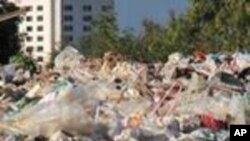<!-- IMAGE -->
Marine debris is a global problem that harms marine wildlife, degrades ocean habitats, interferes in navigation and safety, hampers fishing, blights coastal communities, and poses a threat to human health and the global economy. Refuse dumped at sea, derelict fishing gear, and land-based sources of waste respect no national boundaries and can travel far from their original source.
Enormous concentrations of marine debris, often referred to as "garbage patches," are found in an area of the Pacific Ocean known as the North Pacific Subtropical Convergence Zone. This area does not have distinct boundaries and varies in strength and location throughout the year. The changing boundaries of the North Pacific Subtropical Convergence Zone make it difficult to accurately measure the size of such "garbage patches."
Measuring the areas is further hampered because much of the debris is comprised of tiny plastic particles, dispersed, or below the surface of the water. Significant amounts of marine debris also can be found elsewhere in the Pacific, Gulf of Mexico, as well as the Indian and Atlantic Oceans.
The environmental threat posed by this marine debris is serious. As the plastics break down, they break into smaller and smaller pieces. Such plastics, made of toxic chemicals, are eaten by seabirds, fish, and sea mammals that include hundreds of species. Some scientists fear that as plastics degrade in ocean water, they leech significant amounts of toxic chemicals.
The United States Government, through its National Oceanic and Atmospheric Administration, or NOAA, is engaged in several international projects and capacity-building efforts to address the marine debris challenge.
These include, but are not limited to: funding over 140 projects across the U.S. focused specifically on marine debris abatement; a joint marine debris project between NOAA and the Republic of Korea's Ministry of Land, Transport, and Maritime Affairs; collaboration with the United Nations Environment Program to provide technical assistance in the Wider Caribbean Region; a partnership between NOAA's National Sea Grant Office and the Government of Indonesia to share information on coastal hazard response, including the handling of marine debris; and focused discussion between NOAA and the United Nations Open-ended Informal Consultative Process on Oceans concerning the problem of marine debris.
The United States is also a party to a number of international conventions including the International Convention for the Prevention of Pollution from Ships, which prohibits the disposal of all plastics from vessels. Working with its international partners, the U.S. is committed to protecting oceans and waterways from the peril of marine debris.













